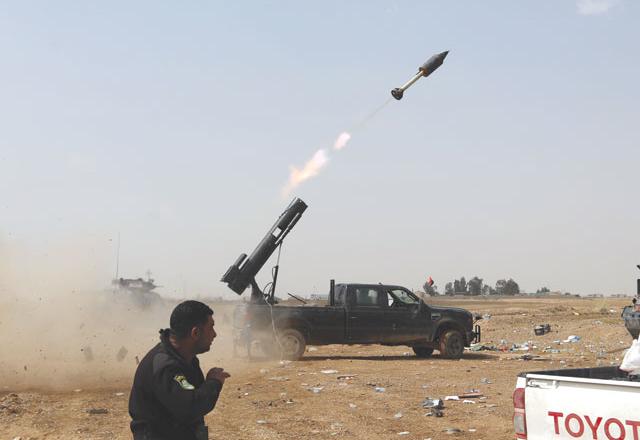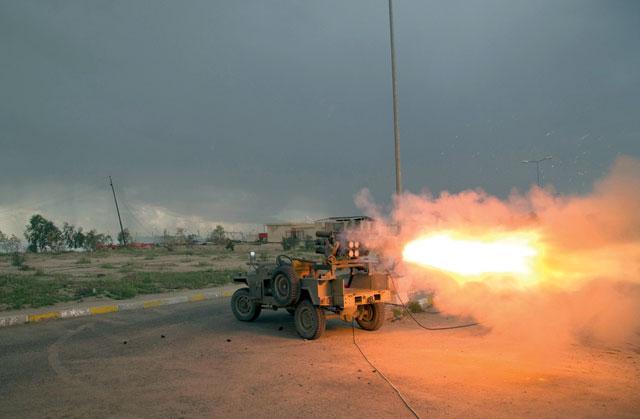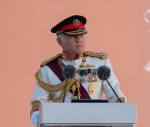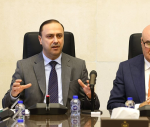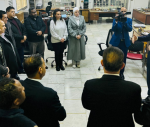You are here
Tikrit victory boosts Iraq fight to eradicate Daesh
By AFP - Apr 01,2015 - Last updated at Apr 01,2015
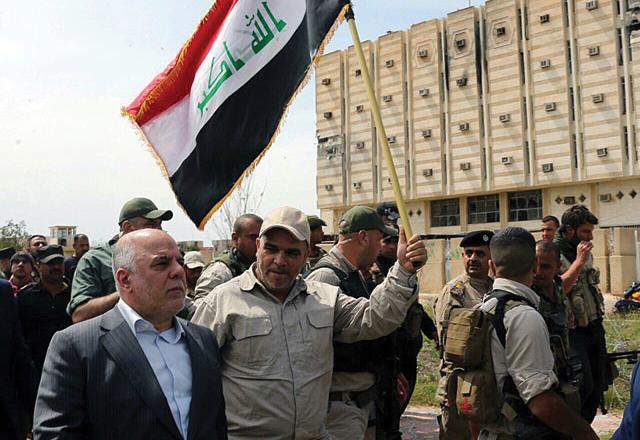
Tikrit, Iraq — Iraq vowed Wednesday to reclaim the entire country from jihadists after having liberated the city of Tikrit, its biggest boost yet in the fight against Daesh terror group.
Speaking from a newly secured area of central Tikrit, Prime Minister Haider Al Abadi said the government was "determined to liberate every inch of Iraqi land".
Iraqi fighters picked their way through the rubble-strewn streets of the city, wary of any last-ditch attack from diehard Daesh fighters and of the thousands of bombs they left behind.
A major military push saw Iraqi police and allied forces retake the city centre on Tuesday but small pockets of jihadist militants remained.
A top leader in the Badr organisation, one of the most prominent Shiite militias in Iraq, admitted that Tikrit had not been completely purged of jihadist fighters.
"Snipers are still there and many buildings are booby-trapped," Karim Al Nuri told AFP in the northern Tikrit neighbourhood of Qadisiya.
A commander for the Ketaeb Imam Ali militia said his men were involved in a firefight in the north of the city in the morning.
They “tried to advance on the university”, Rasul Al Abadi told AFP, adding that there were “no more than 30” Daesh fighters left in the city’s vast Qadisiya district.
Fleeing jihadists
Interior Minister Mohammed Salem Al Ghaban told reporters during a visit to Tikrit that Daesh fighters had tried to cross the Tigris east of the city.
A paramilitary commander said they also launched an attack Wednesday from a mountain hideout northeast of Tikrit in an attempt to open a safe passage to the town of Hawija for fleeing militants.
There has been concern that Iraq does not have enough specialised ordnance clearance teams to handle the quantity of traps left by Daesh fighters.
Ghaban said that security forces had so far found 185 rigged houses and 900 bombs planted on roads.
An official from the governor’s office said municipal teams were already at work in some reconquered neighbourhoods, cleaning debris and restoring power.
On Tuesday, Abadi claimed the city was liberated but the US-led coalition supporting Baghdad from the air said there was “still work to be done”.
Iraq’s top brass was training its sights on Mosul, which jihadist fighters seized from the government at the same time as Tikrit in June last year.
Defence Minister Khaled Al Obeidi vowed Wednesday to press on with offensive operations.
“We are coming, Anbar. We are coming Nineveh,” he said in a recorded address, referring to the last two provinces still largely controled by Daesh.
The loss of Tikrit further isolates Mosul, the capital of Nineveh and the main Daesh hub in Iraq, with Baghdad’s forces now poised to push north while Kurdish forces close in from the three other directions.
Zaid Al Ali, author of “The Struggle For Iraq’s Future”, said however that the fighting in Tikrit was made easier by the fact that the city was largely emptied of its population even before the operation began on March 2.
“Mosul still has a large civilian population, which will make things very complicated,” the analyst said.
US-Iran tension
The government has provided no information on how many fighters were killed, wounded or captured in the fighting but Baghdad’s forces are believed to have suffered heavy casualties.
Iraqi army and police forces, as well as volunteers and Iran-backed Shiite militias, completely surrounded Tikrit within two weeks of launching the operation.
There was a lull in fighting when government forces and their allies balked at the number of snipers, booby traps, berms and trenches which Daesh was using to defend its city centre redoubt.
Iran was Baghdad’s top foreign partner in the early stages of the operation but Iraqi forces were unable to achieve a breakthrough without coalition air strikes.
Abadi requested the strikes and US jets began bombing Daesh targets in Tikrit on March 25.
The Iraqi government had tried and failed several times to retake the hometown of former president Saddam Hussein but the latest operation was larger and better organised.
A significant number of local Sunni tribal forces were involved in the battle to liberate Salaheddin province, of which Tikrit is the capital, from Daesh, in an effort to defuse sectarian resentment.
Amid concerns over abuses committed by Shiite fighters against Sunnis in recaptured areas, the UN’s top envoy in Iraq reiterated an appeal for civilians to be protected.
“Civilians’ safety and security must be protected in line with fundamental human rights principles and humanitarian law,” Jan Kubis said in a statement.
Related Articles
Iraq said on Monday it had put its Tikrit offensive on hold and senior officials called for more air strikes to dislodge Daesh militants, while a Kurdish officer said his forces were exposed to two further chlorine gas attacks by the insurgents.
Iraq said security and allied forces backed by US-led coalition aircraft "liberated" the city of Tikrit on Tuesday, its biggest victory yet in the fight against Daesh militants.
Concern mounted Wednesday over the fate of civilians in Tikrit where Iraqi forces were trying to trap Daesh militants on the third day of a huge offensive to retake the jihadist stronghold.


